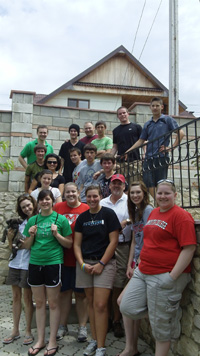The numbers from a Monmouth College trip to the Eastern European nation of Moldova don’t tell the entire story, but they are a good place to start.
Miles traveled: 17,850
Planes: 8
Days: 9
New friends: Dozens
Lives changed: Countless
As the numbers show, getting to and from the former Soviet state wasn’t easy, but it was well worth the effort, a sentiment stated by David Byrnes, the chair of Monmouth College’s board of trustees, who helped organize the travel party of six students and three adults.
Last September, Byrnes made his first trip to Moldova, working with Philip and Chrissie Cameron, a couple dedicated to changing the lives of the nation’s 12,500 orphans. The Camerons’ work at Stella’s House and Simon’s House in the Moldovan capital of Chisinau focuses on saving the lives of teenage children who, upon being forced out of state orphanages in the year of their 16th birthday, often end up victims of sex or slave trafficking.
“It was a life-changing experience for everyone on the trip, but for different reasons than any of us had anticipated beforehand,” said Byrnes. “What impressed our group in a mighty way was seeing that these young people were not bitter, sullen or angry because of the love of God shown through the Camerons. One of our students put it best, saying, ‘We came here because we thought they needed us … but we need them in America and at Monmouth.’”
In a word, said Byrnes, the orphans have “speranza,” which is Moldovan for “hope.”
“They want to change the situation in Moldova for all orphans, not just themselves,” he said. “They shared their hope through their actions and love toward the Monmouth group and our students were moved to share it with them.”
Prior to making the trip, the Monmouth students set goals focused on citizenship, service and learning, which Byrnes said “were met and often exceeded in unexpected ways.” The trip took the form of an international Alternative Spring Break, the popular service-oriented missions that MC students have taken each March to U.S. locations such as the Appalachian Mountains, New Orleans and East St. Louis.
John Cayton, a senior from Clarksville, Tenn., noted, “Many buildings have not been renovated since the Communist government was removed. They were run down and some even appeared to be crumbling. What was even more upsetting about this was seeing the level of potential of this country. The scenery of the land and some of the buildings are amazing, but there is much to work through.”
Moldova’s orphans often fall into that crumbling state, but the work the Camerons are doing is helping bring out the potential that Cayton described.
In a blog that she wrote during the trip, Noelle Burks, a May Monmouth graduate from Manito, commented on a typical day for the group.
“We had a delicious lunch with them of traditional Moldovan soup and salad. Then, we went outside and taught the boys to play ‘Knockout.’ They loved to play basketball and soccer. We played for quite a while until we had to leave to visit the Straseni orphanage, where our good friends Dasa and Natalie lived before they came to Stella’s House.”
Burks also wrote about a bench that was located at Straseni.
“This bench is very significant to the girls that have come from there. When Philip first saw it, there were 18 girls sitting on the bench. The director of the orphanage said that they all had to leave because they were too old to stay at Straseni any longer. Philip only had three beds left in the house and had to choose only three of those 18 girls. He said it was the hardest decision he ever had to make.”
One of those three was Dasa, who led the Monmouth College group on a tour.
“We saw the tiny rooms and the thin mattresses that they slept on,” Burks wrote. “The toilets and showers are in separate buildings that the children have to walk to. The bathrooms were awful. I couldn’t imagine having to use them. The whole experience was very humbling.”
In a talk later that day with the students, Cameron explained that he started his work after his father twisted his arm to help the children in Moldova. Now that they’ve experienced a week in Moldova, members of the Monmouth group might attempt some “arm-twisting” of their own to encourage more donations and mission trips.
Monmouth College has already held a successful clothing drive, collecting nearly 1,000 winter items last November.
Psychology professor Kristin Larson, who helped lead the clothing drive, had been scheduled to make the trip but had to cancel her plans late in the process. The rest of the travel party included senior development officer Mary Stahl, Polly Timmerman (wife of dean of the faculty David Timmerman), senior Mary Schuch of Woodstock and May graduates Whitney Bergen of Chillicothe, Natalie Lister of Hillsboro and Sarah Stinson of Kewanee.
Stahl said she was struck by several instances of the contrast between stepping back in time and modern amenities, such as seeing satellite dishes on century-old buildings.
“We’d see people doing laborious jobs in the fields with old-world, manual tools – tools your great-great grandfather would have used,” she said. “We saw one man doing that type of work, with a rope for a belt. And then there he was, talking on a cell phone.”
On June 5, when the group was preparing to leave, Byrnes said it was an emotional time.
“They shed tears and prayed together,” said Byrnes. “It was incredible to watch this spiritual and emotional bonding take place. Friendships were forged, and there were talks about future possibilities for each other both in Moldova and the U.S. It was global citizenship being created at the best level.”
Barry McNamara is associate director of communications, director of the news bureau and women's soccer coach at Monmouth College in Monmouth, Ill.

